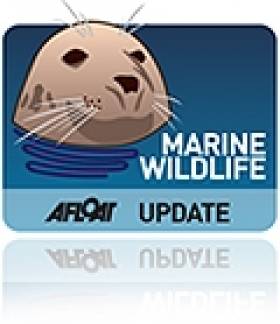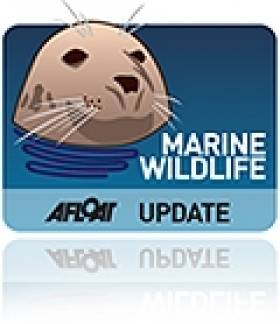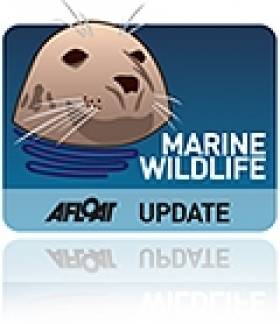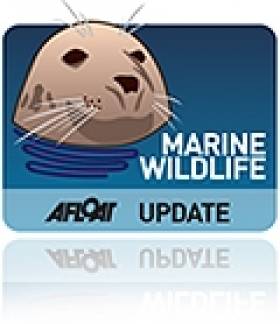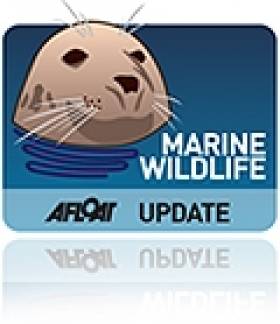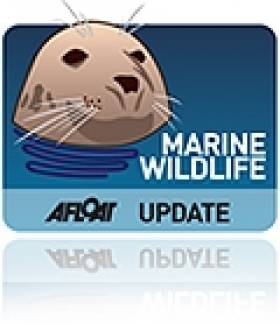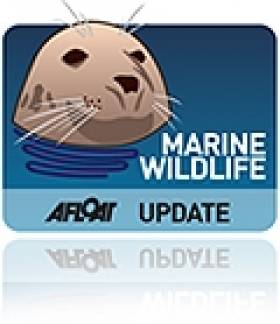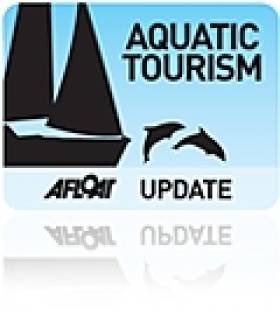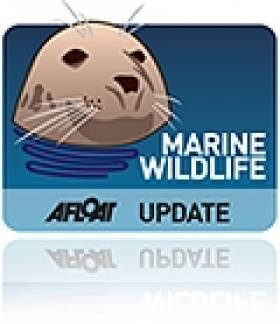Displaying items by tag: Dolphins
Cardigan Bay's Dolphins Take Winter Breaks in the Isle of Man
#MARINE WILDLIFE - The famous dolphins of Cardigan Bay have been found to cross the Irish Sea to spend their winter holidays in the Isle of Man, WalesOnline reports.
New evidence uncovered by researchers at the Cardigan Bay Marine Wildlife Centre (CBMWC) confirms that dolphins from the New Quay area on the Welsh coastline have been photographed over the winter hundreds of miles north by conservationists in Douglas.
As many as eight vacationing cetaceans have been identified by matching markings on their dorsal fins, with one being a regular visitor since 2005.
“We’re really excited about this because it confirms how far the Cardigan Bay dolphins roam in the winter months when we see fewer of them at New Quay – knowledge we need to have if we’re to protect them successfully," said CBMWC science officer Sarah Perry.
Cardigan Bay is home to Europe’s largest population of bottlenose dolphins and is one of the last remaining places in the UK where the species thrives.
WalesOnline has more on the story HERE.
Whale and Dolphin Strandings On the Rise in 2012
#MARINE WILDLIFE - The rate of cetacean strandings on the Irish coast remains unusually high, according to the Irish Whale and Dolphin Group (IWDG).
The group's Cetacean Stranding Scheme recorded 162 strandings in 2011 which, while numbers do vary from year to year, was 25-30 more than anticipated.
And already this year the numbers are up on last year's 'inexplicable' records for the first quarter.
Some 21 strandings were reported to the IWDG in January alone - the highest ever number recorded for that month, well above the average of 13.
February's figures are even more worrying, with 30 strandings reported this year compared to a five-year average of 11.4.
"As we are now well into 2012, it is clear that the numbers have not returned to what we could have considered to be more normal levels," said the group in a statement.
There is as yet no explanation, whether a single cause or a number of factors, for what might be causing this significant rise in strandings of both live and dead animals, although one curious clue is "the number of carcasses which had washed ashore with tail fluke/fins apparently cut away".
In other IWDG news, the group recently announced the receipt of £2,000 (€2,400) core funding support from Scottish-based veterinary X-ray firm BCF Technology Ltd, which funds a number of charities through its BCF Foundation.
Garda Investigates Waterford Seal Shootings
#MARINE WILDLIFE - Newstalk reports that gardaí are investigaing the shooting of seals on a Waterford beach.
As previously reported on Afloat.ie, fears are mounting of an illegal cull of marine wildlife in the area after a seal and a dolphin were found dead from gunshot wounds within a day of two seals being discovered with similar wounds.
All four animals were found along the same stretch of Tramore Beach late last month.
A spokesperson for the Irish Seal Sanctuacy pointed the finger at an illegal cull allegedly carried out by local fishermen.
The Irish Wildlife Trust has welcomed the Garda investigation into the incidents, and has called on the public to report any relevant information they may have.
IWDG to Host European Cetacean Conference in Galway This March
#MARINE WILDLIFE - The Irish Whale and Dolphin Group (IWDG) will host the 26th annual European Cetacean Society Conference in Galway on the weekend of 24-25 March this year.
The Galway Bay Hotel will be the site for the main conference sessions, while workshops will also be held at the Galway-Mayo Institute of Technology (GMIT).
This year's gathering is being held under the theme 'Communication: Information and Ideas Worth Sharing'. Participants will be exploring communication between marine mammals as well as between marine scientists, and between scientists and the public.
As Ireland's Wildlife reports, the conference "offers a offers a great opportunity to find out more about whales and dolphins, their conservation, the cetacean research being carried out in Europe and to meet the researchers who are working to uncover the mysteries of these most enigmatic of creatures."
Registration is now open for the two-day event. For full details of the conference programme, venues and booking information, visit the European Cetacean Society Conference micro site HERE.
Record Year for Whale and Dolphin Strandings
#MARINE WILDLIFE - The Irish Whale and Dolphin Group (IWDG) says 2011 was a record year for whale and dolphin strandings, according to The Irish Times.
IWDG co-ordinator Dr Simon Berrow confirmed a total of 160 strandings reported by year's end.
"This is by far the highest total for the number of stranding records and the third highest total for sighting records since the IWDG recording schemes were established in 1991," he said.
The 2011 record compares to a figure of 92 stranded cetaceans in 2010 - a number much lower than previous years.
Dr Berrow explained to BBC News: "The figures for 2010 were very low, and, we think, this was due to the easterly winds that year. But now we are back up to the kind of level we expect."
Stranding records in 2011 were characterised by a very high peak of common dolphin strandings during February and a high number of porpoise strandings during the winter.
Meanwhile, Dr Berrow considered the latest sightings record "very impressive" given the exceptionally poor sea conditions during autumn and winter.
More than 1,500 whale and dolphin sightings were made in 2011 around the entire coastline of Ireland despite the bad weather.
Whales, Dolphin Found Beached on West Coast
#MARINE WILDLIFE - Three whales and a dolphin were found beached over the past few days along Ireland's west coast, according to the Belfast Telegraph.
Dr Simon Berrow of the Irish Whale and Dolphin Group confirmed that reports had been received of a bottlenose whale on White Strand in Co Clare, a pilot whale on Fintra Beach in Co Donegal and a dolphin in Silverstrand, Co Galway - all found dead.
The latest find was a male sperm whale stranded on Omey Island in Co Galway, shed of its skin and with a broken lower jaw.
"Chances are it died offshore and got washed in with the wind," said Berrow.
The IWDG said such strandings were relatively common, although as reported on Afloat.ie earlier this year there has been growing concern over the rising number of dolphin deaths along the south coast in particular.
Bottlenose Dolphin Pod Seen Again Off Dublin Coast
#MARINE WILDLIFE - They were thought to have disappeared from the east coast in October after delighting wildlife enthusiasts in Dublin and Wicklow.
But concerns that one of the group had died were swept side when the pod of three bottlenose dolphins was once again spotted off Killiney recently.
The Wicklow People reports that the two adults and one juvenile reappeared almost two weeks ago, and have been seen daily "putting on great displays of leaping, breaching, and tail slapping".
Fears were that tragedy had befallen the group when two bottlenoses were seen off Skerries and Balbriggan in late October, and a juvenile was found dead in Portmarnock shortly after.
As previously reported on Afloat.ie, some 200 sightings of the dolphins between Dalkey Island and Wicklow town in recent months were validated by the Irish Whale and Dolphin Group (IWDG).
According to the IWDG, evidence suggests that the pod is now resident off the east coast.
The Wicklow People has more on the story HERE.
Public Needed to Help Record Whale and Dolphin Strandings in UK
#MARINE WILDLIFE - Some 46 reports of stranded whales and dolphins in Northern Ireland are among the thousands recorded across the UK over the last six years, according to BBC News.
A new study co-ordinated by the Zoological Socoety of London (ZSL) shows that some 3,500 cetaceans were stranded on the British coastline between 2005 and 2010.
Though year-on-year figures have fallen overall, is presumed that many more strandings have gone undetected.
Many were found to have died of disease or starvation – particular harbour dolphins.
But human activity such as fishing, shipping and chemical pollution also poses a significant threat to marine wildlife in the waters around the British Isles, said Rob Deaville of the ZSL.
The public is being encouraged to report stranded marine mammals to help create a more accurate picture.
BBC News has more on the story HERE.
Cork The Place to Be For a Holiday On The Sea
#TOURISM - Winter might be upon us, but it's a great time to plan a new year holiday in Ireland on the sea, according to the UK's Daily Echo.
From night-time paddling in with renowned kayaking instructor Jim Kennedy, to snorkelling in Baltimore, relaxing in Skibbereen and and fresh seafood lunches in Kinsale, a vacation in Cork can appeal to any taste.
Whale and dolphin watching is a big draw for the region, too, as Ireland's coast – the first cetacean sanctuary in Europe - plays host to a growing variety of species.
The summer feeding grounds off the southern coast are particularly busy, and tourist boats are often treated to whales breaching the surface and surrounded by dolphins putting on a show.
The Daily Echo has more on the story HERE.
Bottlenose Dolphins Living On Ireland's East Coast
The Irish Whale and Dolphin Group (IWDG) has said that evidence suggests a pod of three bottlenose dolphins is living on the east coast of Ireland.
According to RTÉ News, the organisation as validated close to 200 sightings of the dolphins - one of whom was spotted off Co Down in October 2010 - along the Dublin and Wicklow coastline in the last year.
The IWDG's Pádraig Whooley says that further analysis of theor movements show that they rarely travel north beyond Dalkey Island or south of Wicklow town, indicating a core range of 21 miles (33km).
"Remarkably, they seem to split their time evenly between their Dublin and Wicklow hotspots, thus making them extremely easy to locate, observe and photograph," he adds.
"In fact... the best way to find them other than checking this site, is probably to jump on a DART train in Dun Laoghaire bound for Greystones (or visa versa), making sure to look out the correct window."
While well known for being "boisterous, interactive and gregarious", bottlenose dolphins are also "indescriminate killers of porpoises and other dolphin species, with well-documented cases of infanticide".
Neither are they to be taken lightly by swimmers, with "a case load in Ireland of attacks on swimmers leading to serious injury, and at least one overseas case of [a bottlenose] killing a swimmer.
"It's nice to be able to boast of an apex predator lurking so close to the capital," says Whooley.
RTÉ News has images of the dolphins in action off the south Dublin coastline HERE.



























